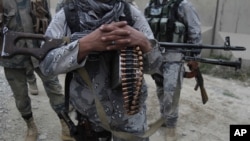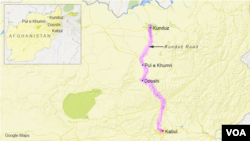Afghanistan's security chief is directly blaming neighboring Pakistan’s military intelligence agency for being behind the Taliban’s expanded insurgent activities in his country.
Briefing lawmakers Monday in the lower house of the national parliament, Massoud Andarabi, the acting head of the National Directorate of Security, warned that the Islamist insurgent group is determined to continue and intensify its violent campaign in the coming Afghan warmer months.
“Intelligence agency ISI is completely supporting them (the Taliban) and encouraging them to continue the Afghan war and capture territory,” he alleged, referring to Pakistan military’s Inter-Services Intelligence.
Afghanistan and Pakistan, with the support of the United States and China, have been trying to arrange direct peace talks between the Kabul government and the Taliban and an initial meeting was expected to take place earlier this month in Islamabad.
Taliban rejects dialogue
But the insurgent group refused to attend and its fugitive leader, Mullah Akhtar Mansour, has instead recently asked Taliban fighters to prepare for a “decisive battle” this summer to take advantage of battlefield victories over the past year.
Speaking separately to a meeting of civil society groups in Kabul Monday, Deputy Foreign Minister Hekmat Khalil Karzai suggested that Islamabad was supposed to take action against Taliban leaders sheltering in Pakistani areas if they refused to come to the negotiating table.
“But it seems the assurance that we were given by Pakistan have not yet been delivered or have not yet been met,” said Karzai, who is also the chief peace negotiator of the Afghan government.
Karzai says that the Afghan government plans to approach Chinese and US interlocutors in the four-nation group to discuss certain actions Pakistan needs to take.
“If, collectively, all of us decide that certain groups are not going to negotiate and if we deem them as irreconcilable, then very specific action must be taken to deal with them. Thus far, we have yet to see full sincerity and we need to make sure that we further come together and discuss some of these issues,” Karzai asserted.
Pakistani officials were not available immediately for their reaction to the Afghan spy chief’s allegations or assertions made by Karzai.
Allegations against ISI
Afghan leaders have long accused ISI of interfering in their internal political and security affairs.
But internationally-backed efforts to ease tensions between Pakistan and Afghanistan and encourage them to cooperate in ending the Afghan war have in recent months led to a reduction in mutual allegations and eased tensions.
Afghan officials say senior Taliban leaders are sheltering and directing the insurgency from their sanctuaries in the neighboring country.
Afghan intelligence chief Massoud spoke shortly after rockets fired by Taliban fighters hit the compound of the newly-built parliament building, but caused no casualties, according to officials. A Taliban spokesman claimed it was behind the attack.
Meanwhile, government and insurgent officials confirmed fresh fighting in the northern province of Kunduz. Both sides claimed they inflicted heavy casualties on the other in Dashte Archi district.
A Taliban spokesman said Afghan forces backed by fighter planes and U.S. drones overnight attacked their positions and clashes continued on Monday. Afghan officials say air raids killed more than two dozen Taliban fighters.
There was no independent confirmation available immediately.
The United Nations and the U.S. military says the Taliban has captured more territory in 2015 than at any point since it was ousted from power in 2001.












